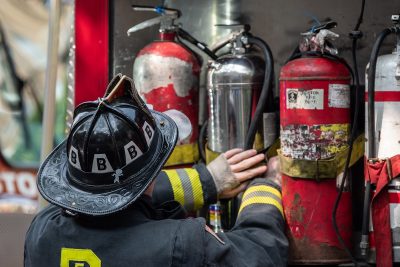Twenty-five Massachusetts members of the Federal Emergency Management Agency’s Urban Search and Rescue team returned home Sunday after they were deployed to help with Oregon’s wildfires.

Personnel and resources from 39 states and several Canadian provinces were sent to help the state.
The volunteers from the Beverly-based Massachusetts Task Force 1 did not fight the fires, said Thomas Gatzunis, planning team manager and structures specialist for the Massachusetts Task Force 1. Instead, he said the team assessed damage and located survivors.
About 1 million acres have burned in Oregon this year, according to an Oregon Department of Forestry report released Monday, nearly twice the 10-year average of 557,811 acres.
Bobby Better, a task force leader, said all victims were accounted for from their areas of operation. He said his team returned with a greater appreciation for authorities responding to the forest fires.
“The total annihilation of all organic matter on the ground was shocking,” said Better, who had worked in the aftermath of Hurricane Katrina and at the World Trade Center on Sept. 11, 2001.
Gatzunis said firefighters who have worked for decades had not seen that level of fire before.
“They were amazed by the amount and the sheer volume of area that was devastated,” Gatzunis said.
Daniel Leavell, a fire specialist and associate professor of practice at Oregon State University, said West Coast wildfires have grown in recent years, fueled by increased populations and exacerbated climate conditions.
“This is the first time I’ve seen fires of this extent on the populated areas of the state of Oregon to this magnitude,” Leavell said.
Leavell said these larger wildfires are caused by changing conditions, including high temperatures, dry atmospheric conditions and high winds.
Firefighters are now playing defense against the devastating fires rather than offense, Leavell said. Normally, firefighters can stop fire spread, but he said the increased scale of recent wildfires has made that degree of containment too dangerous to try.
“You never send resources in front of a fire, you never send them in conditions where they won’t survive,” Leavell said. “You can’t directly attack a fire as often as you could before.”
The fires were driven by 40- to 60-mph winds, Leavell said, making it nearly impossible to get in front and extinguish them.
“All you can do is hope people evacuate, get them out safely and save lives,” he said. “The best approach you can take is prevention, is pre-planning, is mitigation upfront.”
If additional resources are needed in the future, the Massachusetts Task Force 1 is available to return if requested by its managing agency FEMA.

